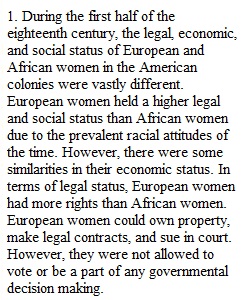


Q Please read "Written Work" and "Sample Essay and Short-Answer Questions" on the course home before beginning your first assignment. 1. Compare and contrast the legal, economic, and social status of European and African women in the American colonies during the first half of the eighteenth century. Your answer should consider the impact of racial attitudes on any differences you may discern in the status of these women, but you should also point out evidence for perceived similarities in the way women were treated in colonial society. Illustrate your essay with specific examples from the reading. 2. One colonial settler described life in America as “a Paradise on earth for women.” Assess the validity of that comment as an accurate statement about the situation of women in the English colonies before 1763. Your answer should consider the legal status of women, their economic opportunities and limitations, and their personal situation in the emerging society. Illustrate whatever position you adopt with specific examples from the reading. 3. Identify and give the historical significance of each of the following: A. Anne Hutchinson B. Civil Death C. Salem witch trials D. Anne Bradstreet E. free women of color To submit your assignment: • Save your document as a .docx or .doc file. • Use this file naming convention: LastNameAssignmentNumber.fileextension (Smith1.doc). • Click on Submit Assignment to upload your file. • Once you submit your file, you will not be allowed to make any changes to your submission.
View Related Questions